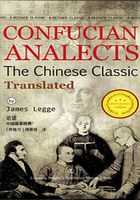
CHAPTER 12
Tsze-kung said, "The Master's personal displays of his principles, and ordinary descriptions of them may be heard. His discourses about man's nature, and the way of Heaven, cannot be heard."
10. UNBENDING VIRTUE CANNOT COEXIST WITH INDULGENCE OF THE PASSIONS. Shin Ch'ang (there are several aliases, but they are disputed,) was one of the minor disciples, of whom little or nothing is known. He was styled 子周, and his place is 31st, east, in the out. ranges. 刚 is to be understood with reference to virtue. 欲 is 情所好, 'what the passions love', 'lusts'. 焉得 are said to=不是, and not 不能. I have transl. accordingly.
11. THE DIFFICULTY OF ATTAINING TO THE NOT WISHING TO DO TO OTHERS AS WE WISH THEM NOT TO DO TO US. It is said—此章见无我之不易及, 'this ch. shows that the no I (freed. from selfishness) is not easily reached'. In the 中庸, XIII.3, it is said—施诸己而不愿亦勿施诸人, 'what you do not like when done to yourself, do not do to others'. The diff. between it and the sent, here is said to be that of 恕, 'reciprocity', and仁, 'benevolence', or the highest virtue, appar. in the adv. 勿 and 无, the one prohibitive, and the other a simple, unconstrained, negation. The golden rule of the Gospel is higher than both, —'Do ye unto others as ye would that others should do unto you.' 诸=于; 加诸, or 加于, 'to add upon', 'to do to'.
12. THE GRADUAL WAY IN WHICH CONFUCIUS COMMUNICATED HIS DOCTRINES. So the lesson of this ch. is summed up, but there is hardly another more perplexing to a transl. 文章 is the comm. name for essays, elegant literary compositions. Of course that mean. is out of the question. Whatever is figured and brilliant is 文. whatever is orderly and defined is 章. The comm., accordingly, make 文to be the deportment and manners of the sage, and 章 his ordin. discourse, but 闻 is an inapprop. term with reference to the former. These things, however, were level to the cap. of the disci. generally, and they had the benefit of them. As to his views about man's nature, the gift of Heaven, and the way of Heaven generally;—these he only commun. to those who were prepared to receive them, and Tsze-kung is supposed to have expressed himself thus, after being on some occasion so privileged.
